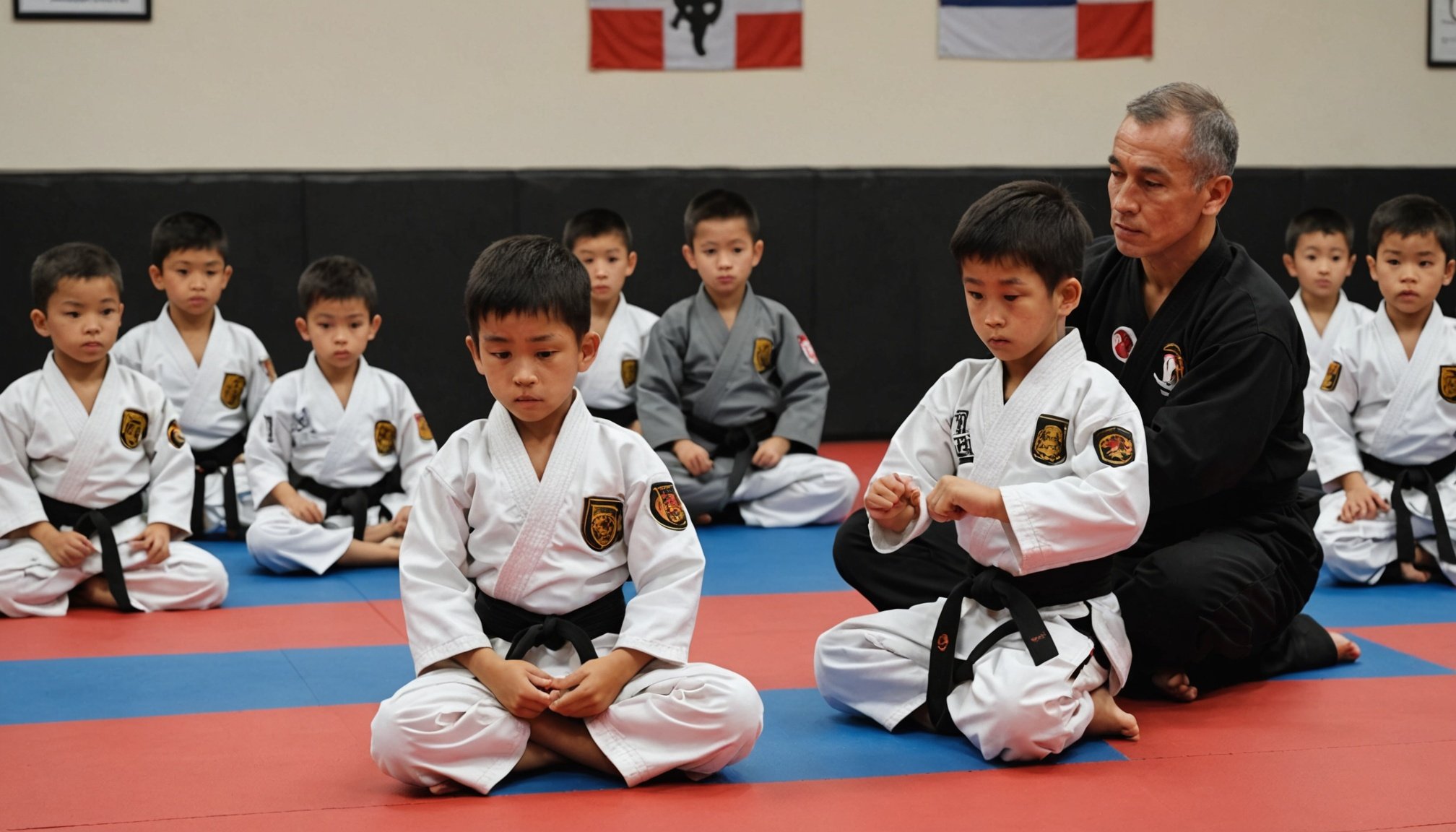Understanding Discipline and Respect in Martial Arts
Within the realm of martial arts, discipline and respect are not merely foundational values; they are pillars that uphold the integrity of the practice. Discipline in martial arts refers to the rigorous training and self-control expected from practitioners. This is evident in the structured routines, precise techniques, and continuous improvement ethos that martial artists adhere to.
Respect in martial arts is equally paramount. It manifests in various forms, whether through bowing, acknowledging opponents, or showing gratitude to instructors. Such gestures signify appreciation for the art form and those who partake in it.
Also to read : Discover durable and stylish tactical bags for every adventure
In the cultural context of UK martial arts, these values are influenced by both traditional Asian philosophies and the multicultural tapestry of modern Britain. The UK has embraced diverse martial arts disciplines, allowing cultural exchange to shape its practices uniquely. This amalgamation enhances students’ understanding, emphasizing both individual growth and community respect, integral for character development.
Ultimately, fostering discipline and respect in martial arts leads to well-rounded practitioners. These values teach perseverance, humility, and empathy, enriching one’s journey both inside and outside the dojo. Such an environment not only cultivates a heightened sense of self-awareness but also promotes harmony among practitioners, reflecting the broader societal ideals of mutual respect and understanding.
Also read : Crafting the Ultimate Travel Itinerary for UK Fighters Competing Internationally
Creative Strategies for Instilling Discipline
Instilling discipline among students can be challenging, but the use of innovative teaching methods brings a fresh approach to this timeless task. One of the effective methods is the incorporation of goal-setting techniques. By setting clear and achievable goals, students are motivated to focus and work persistently towards their objectives, fostering a disciplined mindset.
In addition to goal-setting, gamification elements offer a playful twist that can significantly enhance student engagement. By transforming tasks into rewarding challenges, students are driven to complete them, subtly reinforcing discipline in a fun and engaging manner.
Moving beyond conventional strategies for discipline, martial arts pedagogy has made significant strides in the UK, displaying notable success. Schools have integrated unique methods, merging discipline with education through martial arts’ structured environment. The focus on respect, routine, and perseverance provides valuable lessons that extend beyond the dojo.
Case Studies of UK Martial Arts Schools
- One school implemented tiered reward systems, akin to video game levels, engaging students while promoting discipline.
- Another martial arts academy utilised peer mentoring, allowing experienced students to guide beginners, thus fostering a community-driven atmosphere of discipline.
These strategies illustrate how innovative methods can transform traditional discipline practices, making them effective and enjoyable.
Fostering Respect Among Students
Creating an environment where building respect is a priority can significantly impact peer relationships within a class. One effective technique for developing mutual respect between instructors and students in martial arts training is clear communication. Establishing open dialogue ensures that everyone feels heard and valued.
Peer mentoring plays a crucial role in cultivating respect within martial arts training. By allowing advanced students to mentor beginners, a sense of camaraderie and understanding is nurtured. This approach benefits both parties: mentors improve their teaching skills while mentees gain valuable insights from fellow students.
Community-building activities are another powerful means to promote respect in martial arts settings. These activities, such as group discussions and collaborative exercises, encourage students to work together, fostering a sense of unity. Here are some examples:
- Group discussions: Encourage sharing experiences and perspectives, enhancing understanding and empathy.
- Collaborative exercises: Require teamwork, building trust and reliance on peers.
- Role-playing scenarios: Offer insights into different viewpoints, promoting open-mindedness.
In martial arts, nurturing respect goes beyond technical skills. It’s about developing a supportive, empathetic community where each individual feels valued. These methods—communication, peer mentoring, and community activities—help to strengthen the foundational respect among students, reinforcing positive peer relationships.
Cultural Nuances in UK Martial Arts
In the UK, martial arts culture is deeply shaped by its own rich cultural heritage, influencing the ways in which martial arts are taught. Traditional British values often seep into the teaching styles, emphasizing discipline, respect, and dedication. This cultural lens shapes how instructors approach students, ensuring that both historical and cultural contexts are respected and preserved.
Adapting international martial arts teachings to suit UK students involves understanding diverse backgrounds and experiences. Many UK instructors modify methods to better resonate with local students, thus enhancing learning. This adaptive approach allows learners from various demographics to find spaces where they can flourish, ensuring techniques feel relevant and accessible.
The UK martial arts scene prioritizes inclusive practices, fostering an environment where all individuals feel respected and valued. Creating such spaces requires a commitment to understanding and celebrating differences, whether they be cultural, gender-based, or related to ability levels. This inclusivity not only aids in building physically safe environments but also emotionally supportive ones, encouraging lifelong engagement with martial arts. Ultimately, these practices ensure martial arts in the UK are not just about physical skill but also about building a community rich in respect and mutual understanding.
Successful Practices from Experienced Instructors
Delving into instructor experiences and expert insights can offer invaluable guidance for those seeking to excel in martial arts instruction. Understanding past challenges and triumphs develops a nuanced perspective on success.
Interview with a Veteran Instructor
An interview with a veteran instructor reveals the core tenets of martial arts success stories. Experience with diverse students and evolving teaching techniques paved a clear path for their academy’s success. The instructor emphasised adaptability and communication as fundamental skills. Moreover, understanding each student’s unique pace fosters a personalised growth path.
Case Study of a Successful Martial Arts Academy
Let’s consider a British martial arts academy renowned for its widespread success. The institution thrives on instructor experiences through continuous training and active involvement in community events. Their holistic approach prioritises both physical skills and mental resilience, catering to diverse learner needs.
Best Practices Derived from Instructors’ Experiences
Insights from seasoned instructors offer practical tips for emerging teachers. Valuable practices include:
- Encouraging a student’s learning curve without undue pressure.
- Integrating personal anecdotes during lessons for relatable and engaging training.
- Adopting a classroom environment where mutual respect flourishes.
These experienced professionals’ lessons underscore maintaining perseverance amid challenges and prioritising a growth mindset in students.
Monitoring Progress and Reinforcing Values
In educational environments, student progress tracking plays a crucial role in reinforcing discipline and respect. Regular feedback mechanisms are vital, as they provide necessary adjustments to maintain consistent growth and understanding. For educators, it is essential to establish feedback practices that encourage open communication and prompt correction. This practice can enhance a student’s learning experience by acknowledging achievements and addressing areas that need improvement.
Utilising various tools and methods can effectively monitor classroom dynamics and student advancement. Digital platforms, for example, can offer timely insights into a student’s performance, enabling educators to tailor their teaching methods accordingly. These platforms support not only grade tracking but also incorporate aspects like engagement metrics and participation logs. Such data richness helps teachers identify patterns and address potential issues promptly.
Reinforcement techniques are also indispensable for continuous progress. Strategies like positive reinforcement, where commendation and rewards are given, can motivate students to maintain exemplary conduct and dedication to their studies. Additionally, creating opportunities for students to self-reflect on their academic journey fosters a sense of ownership and personal growth.
Ultimately, these strategies support both students and instructors by promoting an educational climate that values mutual respect and relentless improvement.











